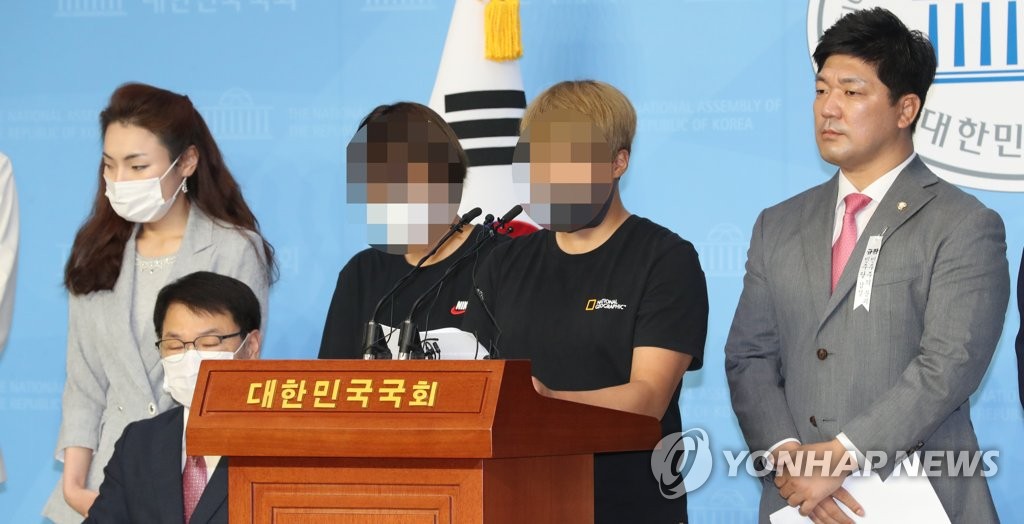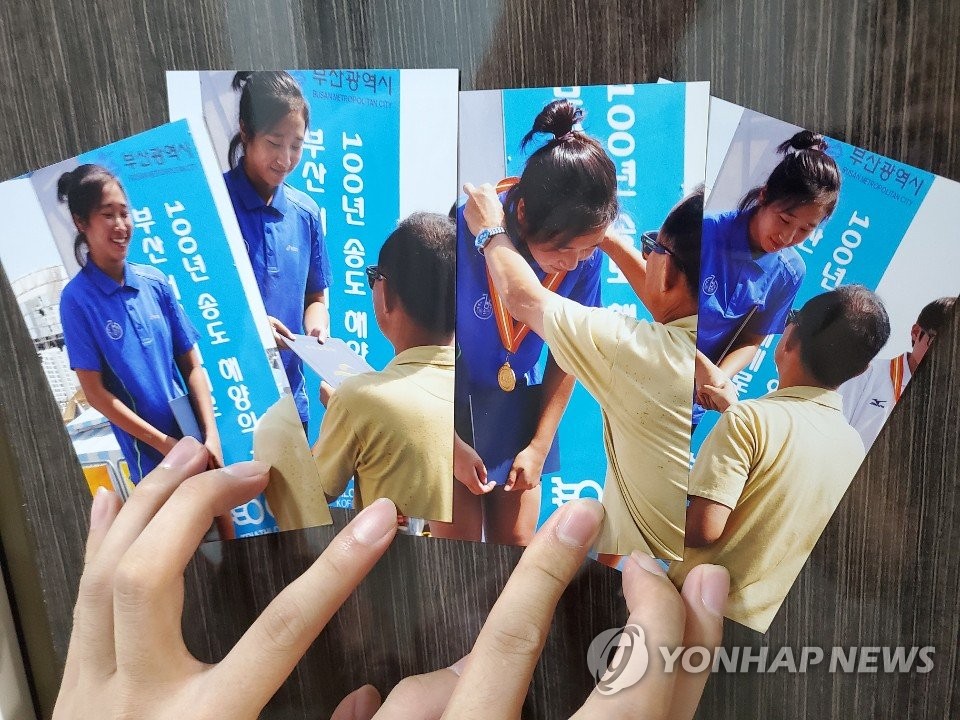- California Assembly OKs highest minimum wage in nation
- S. Korea unveils first graphic cigarette warnings
- US joins with South Korea, Japan in bid to deter North Korea
- LPGA golfer Chun In-gee finally back in action
- S. Korea won’t be top seed in final World Cup qualification round
- US men’s soccer misses 2nd straight Olympics
- US back on track in qualifying with 4-0 win over Guatemala
- High-intensity workout injuries spawn cottage industry
- CDC expands range of Zika mosquitoes into parts of Northeast
- Who knew? ‘The Walking Dead’ is helping families connect
Ex-teammates of late triathlete make more abuse allegations against staff
Former teammates of a late triathlete who took her own life after enduring years of apparent abuse claimed Monday physical and verbal harassment was rampant on their semi-pro club.
In a press conference at the National Assembly, the two triathletes, whose identities were being withheld, supported allegations made earlier by Choi Suk-hyeon, with whom they had competed with on the Gyeongju City Hall team in Gyeongju, 370 kilometers southeast of the capital.


Two teammates of the late South Korean triathlete Choi Suk-hyeon speak at a press conference at the National Assembly in Seoul on July 6, 2020, in support of Choi’s allegations of physical and verbal abuse by her coaching staff. Their faces are blurred to protect their identities. (Yonhap)
Choi, a junior bronze medalist at the 2015 Triathlon Asian Championships, was found dead on June 26 in her home in Busan, 450 kilometers southeast of Seoul. In her last text message to her mother, Choi asked to “expose crimes of those people,” in an apparent reference to her alleged abusers.
In months leading up to her passing, Choi had claimed that she was repeatedly struck by her coach, team therapist and two older teammates. She had also been asked to go three days without eating because she’d failed to keep her weight down, and she had once been forced to gobble up 200,000 won (US$167) worth of pastries as a punishment for ordering a soft drink during a team meal.
The two teammates said they had been afraid of repercussions, but they worked up the courage to support Choi and uncover the truth. They apologized to Choi’s surviving family for not acting sooner and not joining Choi in seeking criminal charges against the alleged abusers.
“Our triathlon team at Gyeonggju City Hall was an empire for the coach and a select few athletes,” they said. “Physical and verbal abuses were common occurrences. The coach constantly hit us, and the team captain was a bully too.”
The two teammates supported Choi’s claims of abuse and said they are also victims.
“We got hit more than 10 days out of a month, while we were competing in Gyeongju,” they added. “I hope that these abusers will admit their guilt and receive due punishment.”
In months leading up to her passing, Choi had pressed abuse charges against her coach, team therapist and two older teammates in Gyeongju. In late May, Gyeongju police forwarded Choi’s case to the prosecution and recommended an indictment on charges of assault and extortion. It wasn’t until last Thursday that Daegu District Public Prosecutors Office said it had been investigating the case and will soon interrogate those facing abuse allegations.
In April, Choi also filed a petition with the Korea Triathlon Federation and the Korean Sport & Olympic Committee (KSOC), seeking punishments for her alleged abusers. Neither of the organizations took action.
Choi had made audio recordings of occasions when she was physically and verbally abused by the team staff and teammates, and these disturbing clips had been reported on television news, sparking further outrage nationally.
These two teammates made more shocking claims, and while Choi’s allegations centered mostly on the coach and the therapist, the two also pointed to the team captain.
“The captain said Suk-hyeon and her father were both psychos and didn’t want anyone to become close to her,” one teammate said. “The captain once dragged me to the rooftop and almost forced me to jump off. I had to beg for my life. And when I missed practice with the flu, the captain had someone hit me with a piece of lumber.”
The two teammates also alleged the therapist sexually harassed them and claimed, “He once said, ‘I am going to drive Suk-hyeon to suicide.’”
The two said Gyeongju police downplayed the gravity of the situation when investigating Choi’s charges. They were called in for additional questioning, but a police detective told them he didn’t want to hear any more allegations of what Choi had already said, and he felt the alleged abusers would get away with a fine and nothing more.
United Future Party Rep. Lee Yong, former head coach of the national bobsleigh team, helped arrange the press conference and praised the two athletes for their courage in coming forward.
“I will protect them the best I can,” Lee added.
Six other Gyeongju triathletes shared their traumatic experiences with Lee.
According to Lee, one triathlete suffered a broken finger after the coach kicked her in the hand, and another had her eardrum ruptured when the coach slapped her in the face.
One athlete was forced to take swimming practice soon after an appendectomy, with stitches still on the area.
Choi earlier claimed she was forced to drink alcohol while training with the Gyeongju club before her high school graduation. One athlete supported the claim, saying the coach forced high school athletes to drink during their training camp in New Zealand in 2015. The underage athletes were told to throw up and keep drinking afterward because they needed that kind of toughness to be triathletes, according to that athlete.
Some of these athletes have already left Gyeongju, and they said they were asked not to talk about rampant abuses to anyone outside Gyeongju.
Choi’s tragedy is the latest illustration of a deeply hierarchical, “win-at-all-costs” sporting culture in South Korea, where coaches or older teammates have been known to resort to abusive behavior against younger athletes in the name of getting the most out of them.
It’s also a somber reminder of just how far the country has to go to eliminate physical, verbal, emotional and even sexual abuses in sports. It was about 1 1/2 years ago that Cho Jae-beom, former coach for Olympic short track speed skating champion Shim Suk-hee, was sentenced to 18 months in prison for physical assault while also facing trial for sexual assault charges.
National sports officials went up in arms over one of the most high-profile abuse cases involving an athlete, but their repeated calls for stern measures ring hollow now in light of Choi’s passing. The national sports community has balked at outside authorities’ attempts to reform, but it has to prove capable of cleaning up itself.












